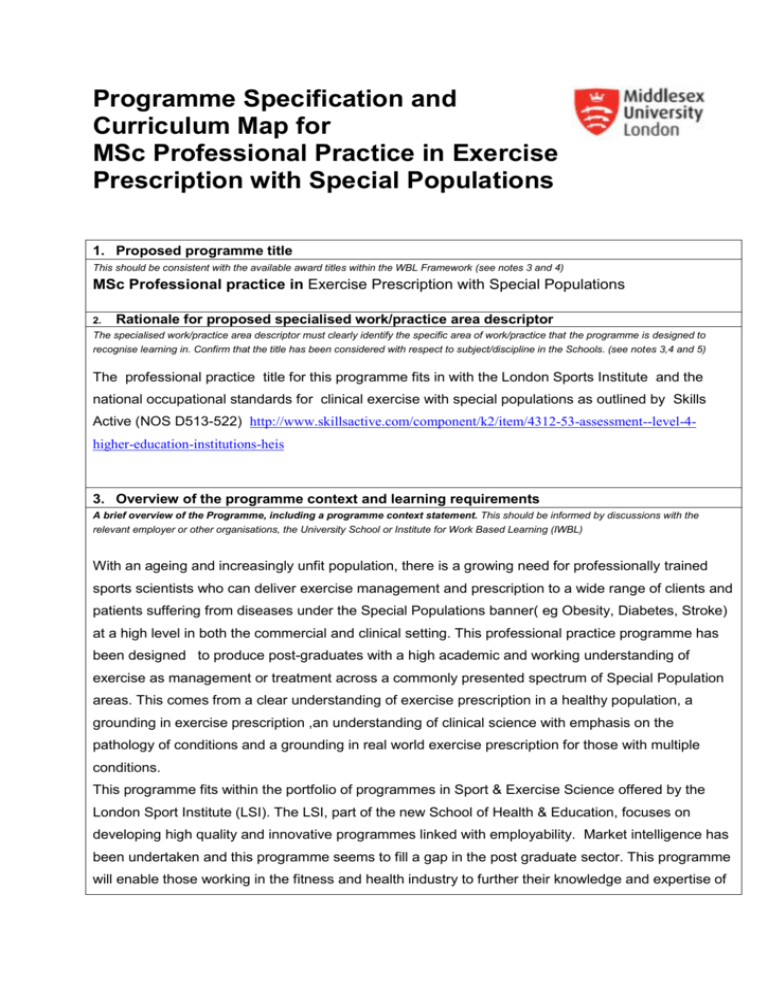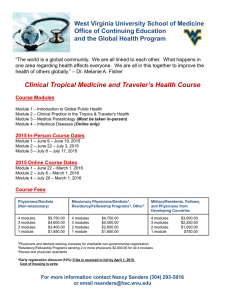MSc Professional Practice in Exercise Prescription with Special
advertisement

Programme Specification and Curriculum Map for MSc Professional Practice in Exercise Prescription with Special Populations 1. Proposed programme title This should be consistent with the available award titles within the WBL Framework (see notes 3 and 4) MSc Professional practice in Exercise Prescription with Special Populations 2. Rationale for proposed specialised work/practice area descriptor The specialised work/practice area descriptor must clearly identify the specific area of work/practice that the programme is designed to recognise learning in. Confirm that the title has been considered with respect to subject/discipline in the Schools. (see notes 3,4 and 5) The professional practice title for this programme fits in with the London Sports Institute and the national occupational standards for clinical exercise with special populations as outlined by Skills Active (NOS D513-522) http://www.skillsactive.com/component/k2/item/4312-53-assessment--level-4higher-education-institutions-heis 3. Overview of the programme context and learning requirements A brief overview of the Programme, including a programme context statement. This should be informed by discussions with the relevant employer or other organisations, the University School or Institute for Work Based Learning (IWBL) With an ageing and increasingly unfit population, there is a growing need for professionally trained sports scientists who can deliver exercise management and prescription to a wide range of clients and patients suffering from diseases under the Special Populations banner( eg Obesity, Diabetes, Stroke) at a high level in both the commercial and clinical setting. This professional practice programme has been designed to produce post-graduates with a high academic and working understanding of exercise as management or treatment across a commonly presented spectrum of Special Population areas. This comes from a clear understanding of exercise prescription in a healthy population, a grounding in exercise prescription ,an understanding of clinical science with emphasis on the pathology of conditions and a grounding in real world exercise prescription for those with multiple conditions. This programme fits within the portfolio of programmes in Sport & Exercise Science offered by the London Sport Institute (LSI). The LSI, part of the new School of Health & Education, focuses on developing high quality and innovative programmes linked with employability. Market intelligence has been undertaken and this programme seems to fill a gap in the post graduate sector. This programme will enable those working in the fitness and health industry to further their knowledge and expertise of this vital area in meeting the Governmental Health agenda for a healthier and fitter Britain. 4. Programme aims This should Include a clear statement of each programme aim describing how the proposed programme will realise these aims as well as any ethical considerations that may be specific to the organisation and/or programme The programme aims to develop practitioners from a range of fitness and health backgrounds, as expert exercise professionals, qualified to work with special populations. To this end the programme includes a combination of subject specific and work based learning modules. The Programme aims, through the two subject specific modules, to provide students with the knowledge and skills: To recognise the health status of an individual to determine the appropriate evidence-based interventions To facilitate the recovery of function and return to health using evidence-based therapeutic and exercise interventions, working in partnership with other professionals as appropriate The programme also aims through the work based learning modules in particular, to develop students as reflective practitioners who are able to critically investigate relevant issues and undertake inquiries to inform their practice. Students will work within the professional codes of practice of Registered Exercise Professionals (REPS) and endorsement of the programme by Skills Active is being pursued. Skills Active is currently developing guidance for programmes at this level and scope. Students will come from a range of health and fitness backgrounds (eg personal trainer, community health professional , physiotherapist) and this will contribute to an inter- professional approach to the learning. 5. Programme design and construction An outline of which University Work Based Learning Framework components will be used to construct the programme. For example, this could includ combinations of accredited in-company training, WBL project modules other WBL Framework modules (eg Review of Learning modules) and other validated modules. This should identify the academic level and volume of credit for the programme and each component. The programme is built around the work based learning framework for professional practice masters programmes and is complied of 50% Sports and exercise science (SES) credits and 50% work based learning credits. MSc Professional Practice in Exercise Prescription with Special Populations Duration Module SES4042 SES4041 SES4013 12 weeks WBS 4630 Programme element Credit value Clinical science for working with special populations 30 Exercise prescription 30 and management in special populations Professional Placement 30 30 Advanced Practitioner inquiry 12-24 weeks WBS 4760 Negotiated Work Based 60 Project 180 credits Credit level 30 7 7 7 7 7 Level 7 6. Description of negotiated programme learning outcomes These should be numbered and reflect the appropriate WBL Framework level descriptor(s) normally including at least one from each category; Knowledge and Understanding, Cognitive Skills, Practical Skills, Personal and Enabling Skills. These Negotiated Programme Learning Outcomes also need to be mapped against Programme Modules in Section 9. Through the programme the student will be able to : Knowledge and understanding 1. Demonstrate a critical knowledge and understanding of clinical science and apply this to the understanding of the health status of individuals, to determine appropriate evidence-based interventions 2. Demonstrate a critical understanding of the ethical principals and professional codes of practice when working with clients for exercise prescription. Cognitive Skills 3. Systematically analyse and synthesise a range of advanced theoretical approaches to exercise prescription to inform and develop evidenced based practice with special populations. 4. Critically evaluate methods of inquiry and problem solving and creatively apply these to enhance their practice and that of others Practical Skills Engage with other professionals, systematically design, implement and manage evidencebased exercise interventions to facilitate the recovery to health . 6. Systematically design and carry out work based inquires to transform their own practice and that of others 7. Systematically manage ideas and information and persuasively communicate ideas for professional and academic audiences 5. Personal and Enabling Skills 8. Critically reflect and analyse their own practice and actively engage in professional development activities to action plan and project their continuing professional development 7. Learning, teaching and assessment strategies Describe the learning and teaching strategies to be employed to support the achievement of learning outcomes. For example, project work, workshops, master-classes, on-line activities etc. Describe the assessment strategies to be employed and indicate how they are appropriate in relation to the required learning outcomes. For example, this could include portfolios, presentations, products such as reports approaches to on-line assessment etc. Blended learning with teaching and assessment focused on important interrelations between knowledge, skill development and professional practice. Seminar, lectures , workshops and tutorials Practical gym based sessions Online reflective journal Professional placements - usually own place of work Online Discussion groups and community of practice Expert seminars Students will also be assessed using a range of methods to ensure the achievement of the knowledge and skills based learning outcomes. Assessment will be through case studies; practical demonstrations with viva ; presentation to their peers ;, work based projects , and written essays and proposals students will also reflect systemically on the development of their professional practice and action plan their future development 8. Negotiated Work Based Learning Project details Where programmes use WBL project modules with negotiated content, each project module’s content; aims, learning outcomes and specific assessment requirements need to be specified to appropriately reflect those of the validated module. This will form the front sheet for any work submitted for assessment in relation to negotiated WBL project modules. Using the standard WBS 4630 and WBS 4760 . No WBL project modules with negotiated content 9. Programme learning outcomes map This table should be used to show the key points (and highest level) at which each Negotiated Programme Learning Outcome (as detailed in section 6 above) is assessed in relation to identified Programme Modules. NB: WBL Framework Programmes can also be constructed from combinations of WBL Framework Modules (WBS) and Subject Specialist Modules (up to a maximum of 50%) Negotiated Programme Learning Outcomes Program me Modules SES4042 SES4041 Progra mme LO1 Progra mme LO2 x Progra mme LO3 Progra mme LO4 Progra mme LO5 x x x Progra mme LO6 Progra mme LO7 Progra mme LO 8 x x x x x SES4013 x WBS4630 WBS4760 x x x x x x x x x x x 10. Professional requirements (as appropriate) A statement how the programme meets professional requirements. For example, professional body requirements, organisational competences etc. This programme is designed to meet the National occupational standards for clinical exercise with special populations as outlined by Skills Active (NOS D513-522) http://www.skillsactive.com/component/k2/item/4312-53-assessment--level-4-higher-education-institutions-heis 11. School/IWBL agreement Confirmation from the relevant School(s) or IWBL of agreement to support the proposal (signed by Dean or Deputy Dean). NB: this will normally confirm approval by the Schools/IWBL Academic Planning Committee. Name: Role Signed: Date: Annex 1 Information for MISIS curriculum creation for new approved programme titles 1. School/IWBL Health and Education 2. If negotiation is in collaboration with an employer or organisation, please specify name 3. All proposed awards MSc only 4. Proposed programme title as it should appear on certificates MSc Professional Practice in Exercise Prescription with Special Populations 5. Programme Leader Anne Elliot 6. Campuses/site codes that the programme should be created for The work based learning modules WBS 4630 and WBS 4760 - WHB 7. Modes of study i.e. part time/Full times and for which study periods can the students apply to commence their studies for example: study periods 1,2,3 Part time Can commence study period 1, 2, 3 8. Target student numbers and FTE Headcount FTE Year 1 Year 2 Year 3 9. Are there special fee rates? What are these? Rhonda Cohen applying for a programme fee . 10. Specify all proposed modules, and the requirement of the length of module runs. For example, one study period etc... SES modules are two study periods. WBL modules are 1 study period. 11. Is the programme eligible for employer engagement co-funding no 12. Contact person details Ruth Miller . Rhonda Cohen Head LSI , Anne Elliot programme leader LSI






